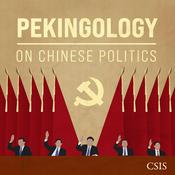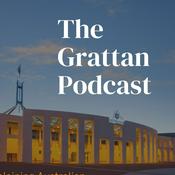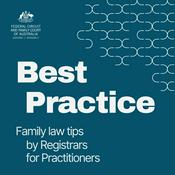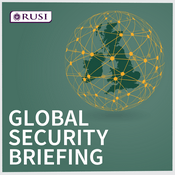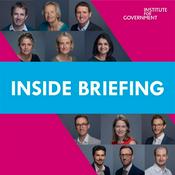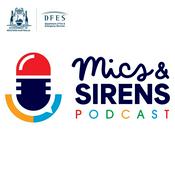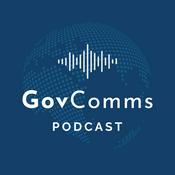86 episodes

Episode 77: Technology, Innovation, and National Security
17/10/2025 | 30 mins.
Arun Gupta, CEO of NobleReach, discusses the importance of combining industry and government to foster innovation in the national security and technology landscape. The relationship between public and private sector talent is based on trust and provides a unique opportunity to make advancements. Additionally, this period in innovation marks an unprecedented shift from historical government-led innovation to private sector-led development. Furthermore, Russia’s War against Ukraine demonstrates this relationship between the government and private sector while pursuing innovation and national security. Arun leaves listeners with three recommendations for how individuals can contribute to the technology and innovation needed to improve national security.Arun Gupta, CEO of NobleReach, is a venture capitalist, Lecturer at Stanford University for “Valley Meets Mission”, and Adjunct Entrepreneurship Professor and Senior Advisor to Provost at Georgetown University, and author of the National Bestseller, “Venture Meets Mission”. Arun is active in the emerging technology, entrepreneurship, public policy, and venture finance communities. As a Partner at Columbia Capital, Arun’s investment career spanned eighteen years including initiating the firm’s Cybersecurity and Government technology investments with a focus on National Security, AI, and SaaS/Cloud infrastructure sectors. Prior to joining Columbia Capital in 2000, Arun was at Carlyle Venture Partners focused on software investments. Prior to Carlyle, Arun held positions in Arthur D. Little’s telecom and technology consulting practice and shared responsibility for establishing ADL’s management consulting operations in Mumbai 1995-98. Arun received a B.S. degree with Distinction in Electrical Engineering and an M.S. degree in Engineering Economic Systems from Stanford University (’91). He received his M.B.A. from Harvard Business School (’95).

Episode 76: Twenty Minutes on Tech with Dr. Daniel Byman
26/07/2025 | 22 mins.
This episode dives into the rapidly evolving landscape of artificial intelligence (AI) and explores how recent trends and developments in the technology continue to transform. This episode also examines the growing challenges of content moderation, as many social media companies continue to scale back their moderation efforts. Peyton Taylor (SSP‘25) hosts Dr. Daniel Byman, Director of the Security Studies Program at Georgetown University and Director of the Warfare, Irregular Threats, and Terrorism Program at CSIS. Daniel Byman is the director of the Security Studies Program and a professor at Georgetown University. He is also the Director of the Warfare, Irregular Threats, and Terrorism Program at CSIS.

Episode 75: Unconventional Maritime Warfare
01/07/2025 | 34 mins.
Sea control is more important than ever. With 80-90 percent of the global trade over sea, it is impossible to maintain the current economic order without stability and security of the world's major trading routes. However, more forces than ever are able to destabilize the global maritime network. Whether it is a resurgence in piracy, increased terrorist threats, or state paramilitary organizations, the number of threats at sea is increasing. Today we sat down with Pieter Zhao to discuss these new threats. We also talk about his research into how states are choosing to meet these threats including his work on private maritime security firms and paramilitary maritime forces. Articles Discussed:https://digital-commons.usnwc.edu/nwc-review/vol77/iss1/7/https://militairespectator.nl/artikelen/winning-without-fighting-indo-pacificPieter Zhao is a PhD Researcher at the Erasmus University in Rotterdam, the Netherlands. His current research project focuses on maritime warfare and security from an applied historical perspective, specifically concerning non-state actors and irregular warfare at sea. After completing his BA and MA in History, he pursued a second Master’s degree in International Security Studies at Sciences Po, Paris. He completed part of his graduate studies at the Johns Hopkins University’s School of Advanced International Studies in Washington DC, focusing on US-China relations, maritime security, and nuclear proliferation. As a historian, his research interests include international security and geopolitics, specifically in the maritime domain and the Indo-Pacific region. He has previously published in the Naval War College Review, European Journal of East Asian Studies, Comparative Strategy, Militaire Spectator, and the Strategy Bridge.

Episode 74: US-Mexico Relations in the Shadow of Fentanyl with Dr. Vanda Felbab-Brown Part 2
13/04/2025 | 34 mins.
Amid President-elect Donald Trump’s recent pledge to impose a 25% tariff on Mexican products, if Mexico does not curb the flow of fentanyl, this episode dives deep into the complexities of U.S.-Mexico relations and the fight against organized crime. Join host Nelly Hernandez Valdez and policy expert Dr. Vanda Felbab-Brown as they explore: Fentanyl and the Cartels: How Mexican criminal groups have become key players in the U.S. fentanyl epidemic and their strategies for controlling local economies and territories. China's Role: The connection between Chinese criminal groups and Mexico’s illegal economies and its implications for global security. Bi-national Cooperation: Why has the Bicentennial Framework between the Biden and Lopez Obrador administrations seen limited progress, and what can we expect under President Claudia Sheinbaum and President-elect Donald Trump as they inherit this complex relationship. Weapons Trafficking: The U.S. gun industry’s impact on cartel firepower and whether reforming firearm policies could disrupt organized crime. Policy Proposals: The effectiveness of proposed measures, such as designating cartels as foreign terrorist organizations or employing military force, and what policymakers can do to achieve real results.Vanda Felbab-Brown is a senior fellow in the Strobe Talbott Center for Security, Strategy, and Technology in the Foreign Policy program at Brookings. She is the director of the Initiative on Nonstate Armed Actors and of the Brookings series "The Fentanyl Crisis in North America and the Global Reach of Synthetic Opioids. She is also the co-director of the Africa Security Initiative. Previously, she was the co-director of the Brookings projects “The Opioid Crisis in America: Domestic and International Dimension," “Improving Global Drug Policy: Comparative Perspectives Beyond UNGASS 2016,” and “Reconstituting Local Orders.” Dr. Felbab-Brown is an expert on international and internal conflicts and nontraditional security threats, including insurgency, terrorism, organized crime, urban violence, and illicit economies. Her fieldwork and research have covered, among others, Afghanistan, South Asia, Burma, Indonesia, the Andean region, Mexico, Iraq and other parts of the Middle East, and various parts of Africa. She was a senior advisor to the congressionally-mandated Afghanistan Peace Process Study Group. A frequent commentator in international and U.S. media, Dr. Felbab-Brown regularly provides testimonies to the U.S. Congress. She also hosts the podcast show “The Killing Drugs: Synthetic Opioids Around the World. ”

Episode 73: National Security, Fiction, And Wicked Problems
09/04/2025 | 42 mins.
A wicked problem is a problem that is difficult or impossible to solve because of incomplete, contradictory, and changing requirements that are often difficult to recognize. In the national security space many of the problems we face are wicked problems. Such problems require creative and unconventional thinkers. Dr. Tammy Schultz believes that fiction provides the tools needed to engage with wicked problems. We talk about teaching creativity, professional military education, and how doing something different than usual can hold the key to literally changing the way your brain works.Dr Schultz is a Professor of Strategic Studies at the U.S. Marine Corps War College and an adjunct professor at Georgetown University's security studies program. She won the Dr. Elihu Rose Award for Teaching Excellence at Marine Corps University. She also was Georgetown University’s Security Studies Program nomination for outstanding faculty mentor in 2019. Dr. Schultz conducts communication plenaries and simulations at the State Department for Foreign Service Officers. Previously, she was a Fellow at the Center for a New American Security (CNAS). Prior to joining CNAS, she served as a Research Fellow and Director of Research and Policy at the U.S. Army’s Peacekeeping and Stability Operations Institute. Dr. Schultz was a Brookings Institution Research Fellow.
More Government podcasts
Trending Government podcasts
About The Precision-Guided Podcast
Listen to The Precision-Guided Podcast, Law Report and many other podcasts from around the world with the radio.net app

Get the free radio.net app
- Stations and podcasts to bookmark
- Stream via Wi-Fi or Bluetooth
- Supports Carplay & Android Auto
- Many other app features
Get the free radio.net app
- Stations and podcasts to bookmark
- Stream via Wi-Fi or Bluetooth
- Supports Carplay & Android Auto
- Many other app features


The Precision-Guided Podcast
download the app,
start listening.


